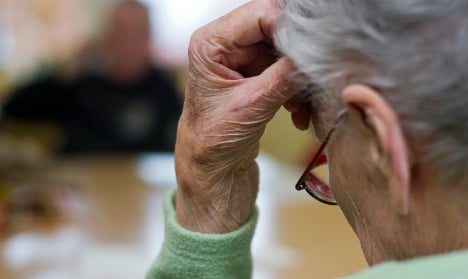The case dates back to 2007 when the City of Malmö, where Jakub Mangell has been an active member of the Jewish community since his arrival in Sweden, confirmed his right to assistance as a result of dementia.
“It is important for my father to be able to follow the Jewish customs and traditions and so we applied for a place for him in a nursing home in Stockholm. There are only two Jewish nursing homes – in Gothenburg and in Stockholm – and my brother lives in Stockholm,” Jakub Mangell’s son, Peter Mangell, told The Local on Monday.
The Jewish nursing home is located in the district of Skarpnäck and is privately run but publicly funded. While the district council has no influence over how the home elects to allocate its places, it administers applicants for care within the district.
When the Mangells approached the council to seek a place for Jakub they were told that as the home was full he could only be offered alternative accommodation.
But Jakub Mangell declined this offer, informing Skarpnäck district council that as his application only concerned the Jewish nursing home he was prepared to wait for a place.
Skarpnäck then rejected his application for assistance, arguing that it had met Jakub Mangell’s need for care and citing the Local Government Act of 1991, which stipulates that a place must be offered within three months of application.
However when The Local called Stockholm city council on Monday to enquire about the process, it was told:
“A needs assessment is made, and the acceptance of the offer of a place is taken to prove that those needs do in fact exist. This can also include social and psychosocial factors, such as being Jewish,” said an administrator at ÄldreDirekt, the council’s helpline for elderly care.
The administrator underlined that the needs assessment is there to ensure the most suitable care is offered, adding that the process should be conducted openly with a designated official.
“Free choice is the current practice and one should be able to choose a nursing home. But if you accept the place on offer, you demonstrate the need for care and can then move later when a preferred place becomes available,” she told The Local.
Having declined the place, Jakub Mangell lost his right to assistance and could not stand in the queue for the Jewish nursing home; the family thus decided to challenge Skarpnäck’s decision in court.
After the Mangells won an initial decision, the district council appealed and won their case in the court of appeal.
But the Supreme Administrative Court has now ruled that, regardless of whether the council was able to offer a place or not, they do not have a right to reject Jakub Mangell’s right to assistance.
The Local informed Peter Mangell of the Supreme Administrative Court’s decision on Friday to find in favour of his father.
“I will have to look at the ruling when I receive it and consult with our lawyer before we decide whether to push for compensation,” Peter Mangell said.
In the years that it has taken for the process to complete its path through the courts, Jakub Mangell has been in the care of family members in Malmö.
The Local called the Jewish nursing home in Skarpnäck to inquire as to how long an applicant can normally expect to wait before being offered a place.
“Impossible to say, it depends on when people pass away,” Kajsa Båkman, the head of the dementia unit at the home, told The Local on Monday.


 Please whitelist us to continue reading.
Please whitelist us to continue reading.
Member comments